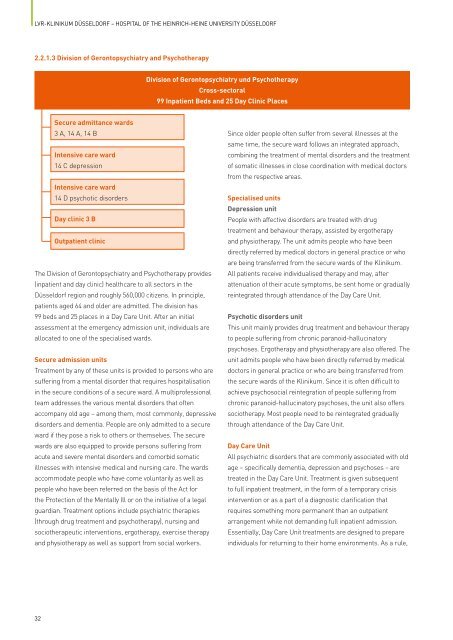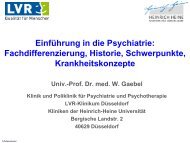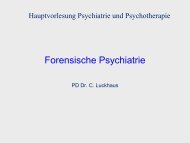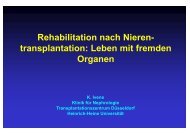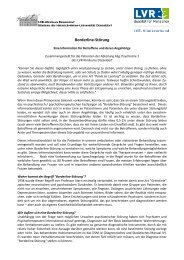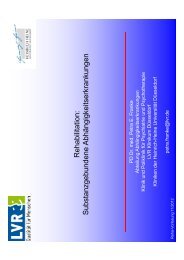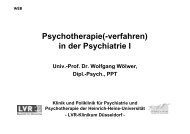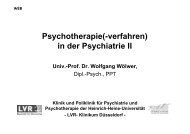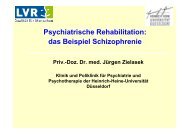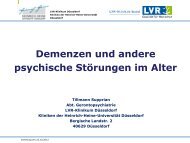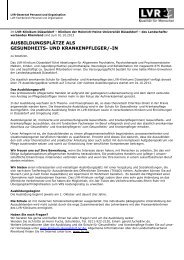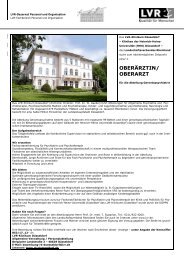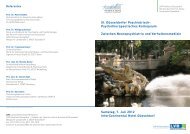LVR-Klinikum Düsseldorf Hospital of the Heinrich-Heine University ...
LVR-Klinikum Düsseldorf Hospital of the Heinrich-Heine University ...
LVR-Klinikum Düsseldorf Hospital of the Heinrich-Heine University ...
Create successful ePaper yourself
Turn your PDF publications into a flip-book with our unique Google optimized e-Paper software.
lVr-KlINIKUM DÜSSelDOrF – HOSPItal OF tHe HeINrIcH-HeINe UNIVerSItY DÜSSelDOrF<br />
2.2.1.3 Division <strong>of</strong> Gerontopsychiatry and Psycho<strong>the</strong>rapy<br />
The Division <strong>of</strong> Gerontopsychiatry and Psycho<strong>the</strong>rapy provides<br />
(inpatient and day clinic) healthcare to all sectors in <strong>the</strong><br />
<strong>Düsseldorf</strong> region and roughly 560,000 citizens. In principle,<br />
patients aged 64 and older are admitted. The division has<br />
99 beds and 25 places in a Day Care Unit. After an initial<br />
assessment at <strong>the</strong> emergency admission unit, individuals are<br />
allocated to one <strong>of</strong> <strong>the</strong> specialised wards.<br />
Secure admission units<br />
Treatment by any <strong>of</strong> <strong>the</strong>se units is provided to persons who are<br />
suffering from a mental disorder that requires hospitalisation<br />
in <strong>the</strong> secure conditions <strong>of</strong> a secure ward. A multipr<strong>of</strong>essional<br />
team addresses <strong>the</strong> various mental disorders that <strong>of</strong>ten<br />
accompany old age – among <strong>the</strong>m, most commonly, depressive<br />
disorders and dementia. People are only admitted to a secure<br />
ward if <strong>the</strong>y pose a risk to o<strong>the</strong>rs or <strong>the</strong>mselves. The secure<br />
wards are also equipped to provide persons suffering from<br />
acute and severe mental disorders and comorbid somatic<br />
illnesses with intensive medical and nursing care. The wards<br />
accommodate people who have come voluntarily as well as<br />
people who have been referred on <strong>the</strong> basis <strong>of</strong> <strong>the</strong> Act for<br />
<strong>the</strong> Protection <strong>of</strong> <strong>the</strong> Mentally Ill or on <strong>the</strong> initiative <strong>of</strong> a legal<br />
guardian. Treatment options include psychiatric <strong>the</strong>rapies<br />
(through drug treatment and psycho<strong>the</strong>rapy), nursing and<br />
socio<strong>the</strong>rapeutic interventions, ergo<strong>the</strong>rapy, exercise <strong>the</strong>rapy<br />
and physio<strong>the</strong>rapy as well as support from social workers.<br />
32<br />
Secure admittance wards<br />
3 A, 14 A, 14 B<br />
Intensive care ward<br />
14 C depression<br />
Intensive care ward<br />
14 D psychotic disorders<br />
Day clinic 3 B<br />
Outpatient clinic<br />
Division <strong>of</strong> Gerontopsychiatry und Psycho<strong>the</strong>rapy<br />
Cross-sectoral<br />
99 Inpatient Beds and 25 Day Clinic Places<br />
Since older people <strong>of</strong>ten suffer from several illnesses at <strong>the</strong><br />
same time, <strong>the</strong> secure ward follows an integrated approach,<br />
combining <strong>the</strong> treatment <strong>of</strong> mental disorders and <strong>the</strong> treatment<br />
<strong>of</strong> somatic illnesses in close coordination with medical doctors<br />
from <strong>the</strong> respective areas.<br />
Specialised units<br />
Depression unit<br />
People with affective disorders are treated with drug<br />
treatment and behaviour <strong>the</strong>rapy, assisted by ergo<strong>the</strong>rapy<br />
and physio<strong>the</strong>rapy. The unit admits people who have been<br />
directly referred by medical doctors in general practice or who<br />
are being transferred from <strong>the</strong> secure wards <strong>of</strong> <strong>the</strong> <strong>Klinikum</strong>.<br />
All patients receive individualised <strong>the</strong>rapy and may, after<br />
attenuation <strong>of</strong> <strong>the</strong>ir acute symptoms, be sent home or gradually<br />
reintegrated through attendance <strong>of</strong> <strong>the</strong> Day Care Unit.<br />
Psychotic disorders unit<br />
This unit mainly provides drug treatment and behaviour <strong>the</strong>rapy<br />
to people suffering from chronic paranoid-hallucinatory<br />
psychoses. Ergo<strong>the</strong>rapy and physio<strong>the</strong>rapy are also <strong>of</strong>fered. The<br />
unit admits people who have been directly referred by medical<br />
doctors in general practice or who are being transferred from<br />
<strong>the</strong> secure wards <strong>of</strong> <strong>the</strong> <strong>Klinikum</strong>. Since it is <strong>of</strong>ten difficult to<br />
achieve psychosocial reintegration <strong>of</strong> people suffering from<br />
chronic paranoid-hallucinatory psychoses, <strong>the</strong> unit also <strong>of</strong>fers<br />
socio<strong>the</strong>rapy. Most people need to be reintegrated gradually<br />
through attendance <strong>of</strong> <strong>the</strong> Day Care Unit.<br />
Day Care Unit<br />
All psychiatric disorders that are commonly associated with old<br />
age – specifically dementia, depression and psychoses – are<br />
treated in <strong>the</strong> Day Care Unit. Treatment is given subsequent<br />
to full inpatient treatment, in <strong>the</strong> form <strong>of</strong> a temporary crisis<br />
intervention or as a part <strong>of</strong> a diagnostic clarification that<br />
requires something more permanent than an outpatient<br />
arrangement while not demanding full inpatient admission.<br />
Essentially, Day Care Unit treatments are designed to prepare<br />
individuals for returning to <strong>the</strong>ir home environments. As a rule,


